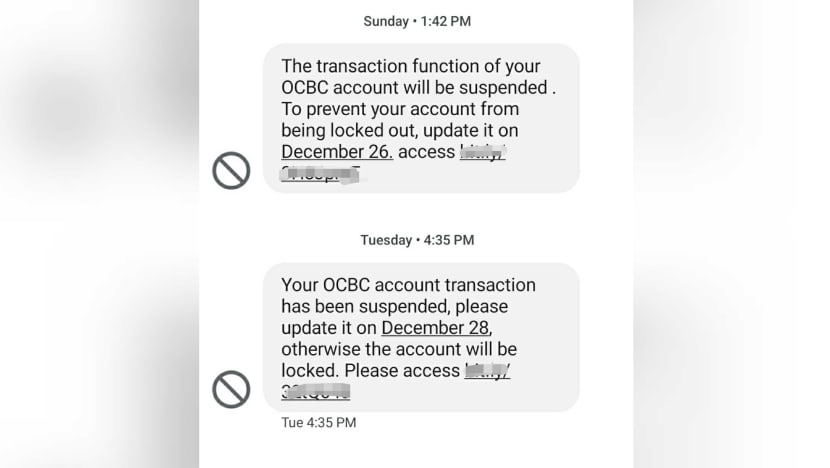Commentary: Scam victims are the first to judge themselves
Scam victims lose more than their savings to phishing and malware scams. Psychiatrist Lim Boon Leng sees the emotional aftermath for victims and their families.

Malware can allow scammers to gain control of a victim’s phone.

This audio is generated by an AI tool.
SINGAPORE: “Possible Unauthorised Access to Your PayPal Account,” read the SMS alert. I paused mid-step, called out to my family asking if anyone had used my account and - instinctively, anxiety rushing in - I tapped the link.
Now, I consider myself a savvy person, well-informed and guarded against new varieties of phishing scams (such as a recent one using fake WhatsApp websites) or malware scams. Luckily for me, my internet service provider had blocked the link and flagged it as potentially harmful. I felt embarrassed that I had immediately assumed that a family member must have compromised my account when I was the one who was careless and had been duped.
Online scams have left many grappling with financial losses. In September, at least 43 victims lost S$1.2 million (US$875,000) after being lured by travel package ads to download malware. More than S$330 million in scam losses were reported in the first half of 2023.
In my practice, I see the aftermath - often a harsh and painful reality, not only for the victims but also their families.
FEELINGS OF GUILT AND SHAME
It’s easy for us to judge scam victims as gullible. Victims themselves would be the first to agree - the immediate feelings of guilt and shame are always palpable. They often obsess over the “if only” that may have averted them from this grim reality.
But the psychological impact on victims can be more profound than that.
Victims who believed they found the love of their life and soulmate lost not just money but their trust in the world around them, scarred by betrayal and ridicule from those around them.
Retired seniors who fell prey to easy money-making schemes lost the savings they toiled for their entire working lives, and now have to deal with the financial uncertainties of the days ahead.
The many more who were victims to credit-for-sex, lottery and recruitment scams would have kept their experience quiet and under wraps, if not for having seen me for their anxiety, hopelessness and anger.
The consequential financial hardship is a constant reminder of their ordeal, making it hard for them to move past the scam.
“I TOLD YOU SO” IS NOT HELPFUL
Family support plays a pivotal role in the healing process for victims. In many cases, families unite, providing both emotional solace and assistance with financial setbacks.
Yet, the dynamics within families can sometimes be complex and challenging, especially if prior warnings about potential scams went unheeded. Telling them “I told you so” doesn’t help; instead it can intensify feelings of guilt and self-blame in the victim, complicating their path to recovery.
Worse, if family members themselves endure financial setbacks because of the scams, the tension in relationships can escalate dramatically.
It's essential for family members to adopt an empathetic stance, steering clear of blame, and concentrating on constructive solutions - even if it proves challenging.
Consulting with financial advisors to craft a recovery strategy can alleviate stress and apprehension. Engaging with mental health experts like counsellors and psychologists can equip victims with effective coping mechanisms.

PERSONAL VIGILANCE AND TECHNOLOGICAL SAFEGUARDS
Above all, it's vital for the individual to come to terms with the losses and stark truths. Yes, they should accept that they made mistakes but also recognise that the vicious cycle of self-blame and sadness won't aid in progression. This is a pivotal step in the healing journey.
How long the ensuing emotional distress lasts differs from person to person - some could grapple with the pain for months or even years. This is shaped by their support networks, coping strategies, and the magnitude of their financial setbacks.
At a roundtable on combating scams in May, I voiced my apprehensions and scepticism about the true feasibility of preventing scams. Relying solely on public education isn't sufficient. Everyone, including experts in the field, remains susceptible, particularly amid hectic schedules, multi-tasking, and moments of human oversight.
The government also acknowledged on Oct 25, in its consultation paper on how the scam losses will be shared, that preventing scams is not only the responsibility of consumers but also of industry stakeholders. Financial institutions act as “gatekeeper against the outflow of monies due to scams”, while telcos are infrastructure providers for SMS.
Vigilance may be the best defence against scams, but scammers are relentless and getting more sophisticated. Technology also grants scammers expansive access to vast audiences, thereby increasing potential victims.
The human psyche is inherently susceptible, and since time immemorial, scammers have mastered the art of manipulating our mental vulnerabilities. The OCBC SMS phishing scam in December 2021 tapped into victims’ fear that they would be locked out of their banking accounts. In other cases, victims downloaded malware trying to get refunds for mooncake purchases.
The distressing tales from scam victims underscore the pressing need for a united front against online fraud. This calls for collaborative efforts from authorities, institutions, social media platforms and internet providers.
Our shared hope is that technology can help be a stronger safeguard when our human vigilance falters.
Dr Lim Boon Leng is a psychiatrist at the Gleneagles Medical Centre.





















